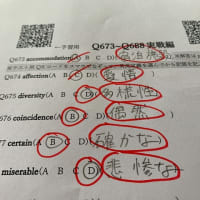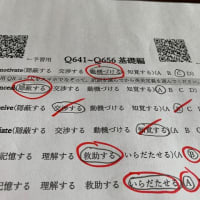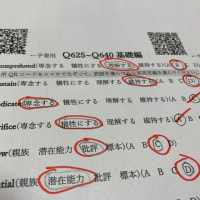日本人が英語を学習するにあたって、和訳は理解度を確認する有効な手段です。ただ、和訳には時間がかかり日本語語の思考回路を起動させてしまうという大きな欠点があります。全文訳にこだわるような英語教育に長いこと馴染んでいると和訳せずには理解できないような状態になり伸び悩みます。以下にお示しするのは、和訳せずに理解度を確認できる長文整序問題です。
2020センター試験本試第6問改題
□Vending machines are so ①(Japan / in / that / common) you can find one almost anywhere you go. Some of these machines sell train or meal tickets, and others sell snacks or drinks. They are ②(useful / people / especially / for) who want to get something quickly and conveniently.
□While vending machines are found throughout the country today, ③(originally developed in / they / not / were) Japan. It is generally believed that the first one was constructed by a Greek mathematics teacher about 2,200 years ago. This machine sold special water used in prayers at temples. People who wanted to purchase the water put in a coin, which hit a metal lever attached to a string. Then, the weight of the coin let a specific ④(pour out / of / amount / water) until the coin fell off. This ⑤(that / ensured / received / people) an equal portion of the special water.
□ About 1,000 years ago, a vending machine that sold pencils was developed in China. Later, in the 1700s, coin-operated tobacco boxes appeared in English bars. When people wanted the product sold by one of these boxes, they inserted a coin and turned a lever. The product then dropped down for the customer to pick up. However, ⑥(not / it / until / was) the 1880s that vending machines spread around the world. In 1883, an English inventor created one that sold postcards and paper. This became popular, and soon vending machines selling paper, stamps, and other goods appeared in many countries. In 1904, vending machines ⑦(in / into / came / service) Japan. In 1926, technology had advanced and machines could be set to sell products with different prices. After that, a wider variety of products were sold. When this happened, the vending machine industry expanded rapidly.
□The greatest problem faced by the global vending machine industry in its expansion was not the use of coins; it was paper money. This was a challenge ⑧(proved / it / easy / as) for dishonest individuals to make money that could fool machines. This forced the vending machine industry to ⑨(better / establish / methods / detection) and was one reason countries took steps to develop money that was difficult to counterfeit. Now, vending machines have become technologically advanced, not only to prevent problems with cash ⑩(accept / but / to / also) credit cards and more recent forms of electronic payment.
□ It is in Japan that vending machines have become most popular. Currently, Japan has more than 4.2 million vending machines, with about 55% of them selling beverages such as tea, coffee, and juice. One of the main reasons Japan has become the vending machine capital of the world is its overall level of safety. Unlike many places, where vending machines must be ⑪(prevent / to / theft / monitored), they can be placed virtually anywhere in Japan. This extraordinary ⑫(safety / of / degree / public) is considered amazing by visitors, as well as the range of products available. Tourists often take pictures of machines that sell unexpected products like bananas, fresh eggs, and bags of rice. It is understandable that visitors see them as ⑬(aspect / to / one / particular) Japanese culture.
□⑭(and usefulness / the popularity / of / given) vending machines, it is unlikely that they will disappear anytime in the near future. They provide a place where various goods can be ⑮(without / for / sold / the need ) a sales clerk. The next time you want to purchase a hot drink on a cold day, remember that, in Japan at least, there is probably a vending machine just around the next corner.
解答)①(common in Japan that) ②(especially useful for people) ③(they were not originally developed) ④(amount of water pour out)⑤(ensured that people received)⑥(it was not until) ⑦(came into service in)⑧(as it proved easy)⑨(establish better detection methods)⑩(but also to accept)⑪(monitored to prevent theft)⑫(degree of public safety)⑬(one aspect particular to)⑭(Given the popularity and usefulness of)⑮(sold without the need for)
※わからない単語が多ければ辞書を使って解いても力はつきます。ただし試験本番で辞書は使えません。大学入学共通テスト 時間内で解ける力がつく英英直読英単語・熟語は、上記の長文中のキーワードを以下の赤字で示したように網羅的にカバーしています。
□Vending machines are so common in Japan that you can find one almost anywhere you go. Some of these machines sell train or meal tickets, and others sell snacks or drinks. They are especially useful for people who want to get something quickly and conveniently.
□While vending machines are found throughout the country today, they were not originally developed in Japan. It is generally believed that the first one was constructed by a Greek mathematics teacher about 2,200 years ago. This machine sold special water used in prayers at temples. People who wanted to purchase the water put in a coin, which hit a metal lever attached to a string. Then, the weight of the coin let a specific amount of water pour out until the coin fell off. This ensured that people received an equal portion of the special water.
□ About 1,000 years ago, a vending machine that sold pencils was developed in China. Later, in the 1700s, coin-operated tobacco boxes appeared in English bars. When people wanted the product sold by one of these boxes, they inserted a coin and turned a lever. The product then dropped down for the customer to pick up. However, it was not until the 1880s that vending machines spread around the world. In 1883, an English inventor created one that sold postcards and paper. This became popular, and soon vending machines selling paper, stamps, and other goods appeared in many countries. In 1904, vending machines came into service in Japan. In 1926, technology had advanced and machines could be set to sell products with different prices. After that, a wider variety of products were sold. When this happened, the vending machine industry expanded rapidly.
□The greatest problem faced by the global vending machine industry in its expansion was not the use of coins; it was paper money. This was a challenge as it proved easy for dishonest individuals to make money that could fool machines. This forced the vending machine industry to establish better detection methods and was one reason countries took steps to develop money that was difficult to counterfeit. Now, vending machines have become technologically advanced, not only to prevent problems with cash but also to accept credit cards and more recent forms of electronic payment.
□ It is in Japan that vending machines have become most popular. Currently, Japan has more than 4.2 million vending machines, with about 55% of them selling beverages such as tea, coffee, and juice. One of the main reasons Japan has become the vending machine capital of the world is its overall level of safety. Unlike many places, where vending machines must be monitored to prevent theft, they can be placed virtually anywhere in Japan. This extraordinary degree of public safety is considered amazing by visitors, as well as the range of products available. Tourists often take pictures of machines that sell unexpected products like bananas, fresh eggs, and bags of rice. It is understandable that visitors see them as one aspect particular to Japanese culture.
□Given the popularity and usefulness of vending machines, it is unlikely that they will disappear anytime in the near future. They provide a place where various goods can be sold without the need for a sales clerk. The next time you want to purchase a hot drink on a cold day, remember that, in Japan at least, there is probably a vending machine just around the next corner.
大学入学共通テスト 時間内で解ける力がつく英英直読英単語・熟語の制作に当たってはセンター試験の過去問全てと共通テスト試行問題を参照しています。上記長文中のvending machineのような文脈から容易に想像できる単語、さらにcounterfeit(偽造する)のようなセンターレベルを超えた難単語は収録しませんでした。しかし、受験生の盲点になりやすいgiven(…を考慮すれば)のようなキーワードは以下のように重点的に取り上げています。
*Given the *ocean's power, *wave *energy seems a *promising *source of *renewable *energy.(319)
*Renewable energy is not an *urgent matter in Australia, *given the country's plentiful *supplies of *fossil fuels, *particularly coal.(699)
※大学入学共通テスト 時間内で解ける力がつく英英直読英単語・熟語には複数の重要語彙を含む例文を精力的に収録し、ネイティブチェックを受けています。
2020センター試験本試第6問改題
□Vending machines are so ①(Japan / in / that / common) you can find one almost anywhere you go. Some of these machines sell train or meal tickets, and others sell snacks or drinks. They are ②(useful / people / especially / for) who want to get something quickly and conveniently.
□While vending machines are found throughout the country today, ③(originally developed in / they / not / were) Japan. It is generally believed that the first one was constructed by a Greek mathematics teacher about 2,200 years ago. This machine sold special water used in prayers at temples. People who wanted to purchase the water put in a coin, which hit a metal lever attached to a string. Then, the weight of the coin let a specific ④(pour out / of / amount / water) until the coin fell off. This ⑤(that / ensured / received / people) an equal portion of the special water.
□ About 1,000 years ago, a vending machine that sold pencils was developed in China. Later, in the 1700s, coin-operated tobacco boxes appeared in English bars. When people wanted the product sold by one of these boxes, they inserted a coin and turned a lever. The product then dropped down for the customer to pick up. However, ⑥(not / it / until / was) the 1880s that vending machines spread around the world. In 1883, an English inventor created one that sold postcards and paper. This became popular, and soon vending machines selling paper, stamps, and other goods appeared in many countries. In 1904, vending machines ⑦(in / into / came / service) Japan. In 1926, technology had advanced and machines could be set to sell products with different prices. After that, a wider variety of products were sold. When this happened, the vending machine industry expanded rapidly.
□The greatest problem faced by the global vending machine industry in its expansion was not the use of coins; it was paper money. This was a challenge ⑧(proved / it / easy / as) for dishonest individuals to make money that could fool machines. This forced the vending machine industry to ⑨(better / establish / methods / detection) and was one reason countries took steps to develop money that was difficult to counterfeit. Now, vending machines have become technologically advanced, not only to prevent problems with cash ⑩(accept / but / to / also) credit cards and more recent forms of electronic payment.
□ It is in Japan that vending machines have become most popular. Currently, Japan has more than 4.2 million vending machines, with about 55% of them selling beverages such as tea, coffee, and juice. One of the main reasons Japan has become the vending machine capital of the world is its overall level of safety. Unlike many places, where vending machines must be ⑪(prevent / to / theft / monitored), they can be placed virtually anywhere in Japan. This extraordinary ⑫(safety / of / degree / public) is considered amazing by visitors, as well as the range of products available. Tourists often take pictures of machines that sell unexpected products like bananas, fresh eggs, and bags of rice. It is understandable that visitors see them as ⑬(aspect / to / one / particular) Japanese culture.
□⑭(and usefulness / the popularity / of / given) vending machines, it is unlikely that they will disappear anytime in the near future. They provide a place where various goods can be ⑮(without / for / sold / the need ) a sales clerk. The next time you want to purchase a hot drink on a cold day, remember that, in Japan at least, there is probably a vending machine just around the next corner.
解答)①(common in Japan that) ②(especially useful for people) ③(they were not originally developed) ④(amount of water pour out)⑤(ensured that people received)⑥(it was not until) ⑦(came into service in)⑧(as it proved easy)⑨(establish better detection methods)⑩(but also to accept)⑪(monitored to prevent theft)⑫(degree of public safety)⑬(one aspect particular to)⑭(Given the popularity and usefulness of)⑮(sold without the need for)
※わからない単語が多ければ辞書を使って解いても力はつきます。ただし試験本番で辞書は使えません。大学入学共通テスト 時間内で解ける力がつく英英直読英単語・熟語は、上記の長文中のキーワードを以下の赤字で示したように網羅的にカバーしています。
□Vending machines are so common in Japan that you can find one almost anywhere you go. Some of these machines sell train or meal tickets, and others sell snacks or drinks. They are especially useful for people who want to get something quickly and conveniently.
□While vending machines are found throughout the country today, they were not originally developed in Japan. It is generally believed that the first one was constructed by a Greek mathematics teacher about 2,200 years ago. This machine sold special water used in prayers at temples. People who wanted to purchase the water put in a coin, which hit a metal lever attached to a string. Then, the weight of the coin let a specific amount of water pour out until the coin fell off. This ensured that people received an equal portion of the special water.
□ About 1,000 years ago, a vending machine that sold pencils was developed in China. Later, in the 1700s, coin-operated tobacco boxes appeared in English bars. When people wanted the product sold by one of these boxes, they inserted a coin and turned a lever. The product then dropped down for the customer to pick up. However, it was not until the 1880s that vending machines spread around the world. In 1883, an English inventor created one that sold postcards and paper. This became popular, and soon vending machines selling paper, stamps, and other goods appeared in many countries. In 1904, vending machines came into service in Japan. In 1926, technology had advanced and machines could be set to sell products with different prices. After that, a wider variety of products were sold. When this happened, the vending machine industry expanded rapidly.
□The greatest problem faced by the global vending machine industry in its expansion was not the use of coins; it was paper money. This was a challenge as it proved easy for dishonest individuals to make money that could fool machines. This forced the vending machine industry to establish better detection methods and was one reason countries took steps to develop money that was difficult to counterfeit. Now, vending machines have become technologically advanced, not only to prevent problems with cash but also to accept credit cards and more recent forms of electronic payment.
□ It is in Japan that vending machines have become most popular. Currently, Japan has more than 4.2 million vending machines, with about 55% of them selling beverages such as tea, coffee, and juice. One of the main reasons Japan has become the vending machine capital of the world is its overall level of safety. Unlike many places, where vending machines must be monitored to prevent theft, they can be placed virtually anywhere in Japan. This extraordinary degree of public safety is considered amazing by visitors, as well as the range of products available. Tourists often take pictures of machines that sell unexpected products like bananas, fresh eggs, and bags of rice. It is understandable that visitors see them as one aspect particular to Japanese culture.
□Given the popularity and usefulness of vending machines, it is unlikely that they will disappear anytime in the near future. They provide a place where various goods can be sold without the need for a sales clerk. The next time you want to purchase a hot drink on a cold day, remember that, in Japan at least, there is probably a vending machine just around the next corner.
大学入学共通テスト 時間内で解ける力がつく英英直読英単語・熟語の制作に当たってはセンター試験の過去問全てと共通テスト試行問題を参照しています。上記長文中のvending machineのような文脈から容易に想像できる単語、さらにcounterfeit(偽造する)のようなセンターレベルを超えた難単語は収録しませんでした。しかし、受験生の盲点になりやすいgiven(…を考慮すれば)のようなキーワードは以下のように重点的に取り上げています。
*Given the *ocean's power, *wave *energy seems a *promising *source of *renewable *energy.(319)
*Renewable energy is not an *urgent matter in Australia, *given the country's plentiful *supplies of *fossil fuels, *particularly coal.(699)
※大学入学共通テスト 時間内で解ける力がつく英英直読英単語・熟語には複数の重要語彙を含む例文を精力的に収録し、ネイティブチェックを受けています。






















※コメント投稿者のブログIDはブログ作成者のみに通知されます